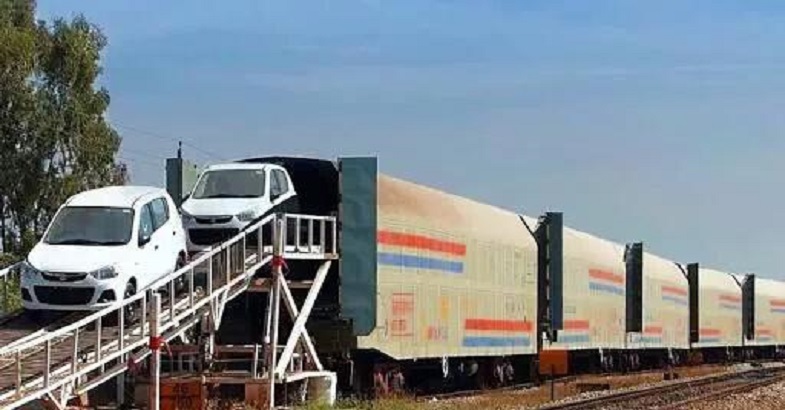
Explore the groundbreaking impact of Indian Railways’ Automobile Freight Train Operator Policy; this article delves into the policy’s success in redirecting automotive transportation from roads to rails, fostering sustainability and economic growth. Join her journey in revealing how strategic policy interventions can reshape the nation’s logistics landscape and contribute to achieving ambitious developmental goals.
Indian Railway lives up to its nomenclature of being the ‘Lifeline of the Nation’. Be it the Bhuj earthquake that shook Gujarat in 2001 or the 2013 floods and subsequent landslides in the holy town of Kedarnath, any threat to the nation’s safety or even the Corona pandemic that hit in 2020, this lifeline has always lived up to its name by ensuring all kinds of relief materials is transported to those affected. This lifeline has not only lived up to its name during challenging times but also has contributed immensely to the country’s socio-economic development by carrying essential freight commodities across the length and breadth of the country.
However, this lifeline needs expansion and invigoration to continue pumping blood into India’s logistics business, which has grown manifold since independence. However, freight loading increased from 73.2 MT in 1950-51 to 1512 Million Tons in 2022-23. Incidentally, this growth has not been commensurate with the growth of the logistics business in the country, which has grown 55 times. Interestingly, the commodities transported have remained almost static, with coal, fertiliser, cement, food grains and Iron ore constituting the major commodities in the basket. For attracting new traffic, initiatives have been taken, and it will be interesting to see how the innovative policy of Automobile Freight Train Operator (AFTO) has changed the freight business of Indian railways and illustrated how well-thought and well-deliberated policy interventions can be a game changer.
Policy Intervention for Attracting Automobile Traffic
One important segment of the Indian logistics ecosystem is the Indian automotive market, which remains third in the world and is growing at a pace of 24%. This traffic, which was majorly transported through the road network, has been successfully diverted to railways through policy intervention of Automobile Freight Train Operator (AFTO). This policy attracts private investment in various types of rolling stock for carrying automobiles through the induction of auto carriers of suitable design and higher throughput in the Indian Railway system to facilitate bulk transportation of automobiles from production clusters to consumption centres. For diverting this traffic to the rail network, the main constraint remained the availability of suitably designed auto carriers in the market and the varied requirements of stakeholders in terms of design. The bureaucratic procedures and complexity of the design issue mandated roping in stakeholders in this business proposition.
This policy has changed the scenario of automobile transportation in the country and holds promises for the automobile sector. This policy facilitates the automobile sector by allowing them to build automobile rakes and run over a wide network of Indian Railways. Whereas policymakers are criticised for overlooking the issues of stakeholders, this policy remains an exception as it has remained dynamic and has been revisited regularly to make it business friendly. Involving stakeholders and meetings with the Society for Indian Automobile Manufacturers (SIAM) and other stakeholders gave way to subsequent amendments, which resulted in the liberalisation of this policy, which, as on date, remains one of the most successful experiments of Public Private Partnership.
Policy Impact
The policy interventions have reinvigorated the policy, and the automobile transportation journey, which started with one investor in 2013, now has five more investors and with a resolution of a few more policy issues, it has the potential to attract more investors. A journey that started with Maruti Suzuki Private Limited now has many stakeholders on board, i.e. M/s APL Logistics Vascor Automotive Private Limited, M/s IVC Logistics, Joshi Konoike Transport and Infrastructure Private Limited, Transport Corporation of India, and Adani NYK Auto Logistics Solutions Pvt.
This policy initiative has increased the modal share of railways in automobile transportation from 1.5 %in 2013 to 19.8% in 2022-23. It will be worthwhile to illustrate the glorious journey of a modal shift from road to rail, from un-sustainability to sustainability practical, slow to expedient and economical transportation.
Table: Automobile Traffic Growth

Source: Indian Railways
There are a few more demands of the prospective stakeholders, such as maintenance of AFTO rakes privately rather than by railways, timetabling of trains and expeditious movement of these rakes. If these issues are addressed, the policy has the potentially attract more investment.
The Way Forward
This policy remains promising and paves the way for exploring new horizons and diversifying the commodity basket, necessary for realising higher modal share as envisaged in policy documents of railways such as the National Rail Plan, Mission 3000 MT and National Logistics policy. This also aligns with the ambitious Sustainable Developmental Goal 9 related to developing resilient and sustainable infrastructure. As the timeline for achieving mission 3000 MT is nearing, and the railway aims to diversify its commodity basket, the AFTO policy can be a model for building more participative policies for attracting and shifting other commodities to the rail sector. The success of this AFTO policy reconfirms the quote of Elizabeth Dole: “The best public policy is made when you are listening to people who are going to be impacted.”

Author’s Bio: Rita Raj, an Indian Railway Traffic Service Officer of 1995 Batch, is currently posted as Senior Professor (Commercial and Business Development) at the Indian Railway Institute of Transport Management (IRITM), Lucknow, and is responsible for designing and conducting courses for railway officers and supervisors to facilitate capacity building. As a traffic officer, she has handled various assignments such as train operations, passenger and freight business development, developing passenger amenities at stations and formulating policies of private investment in Railways. She is a participant of the Co’24 of the Advanced Management Programme in Public Policy (AMPPP) at the Bharti Institute of Public Policy, Indian School of Business. Beyond her professional duties, she finds her calling in trekking, marathon running, and painting.
DISCLAIMER : The views expressed in this blog/article are author’s personal.

